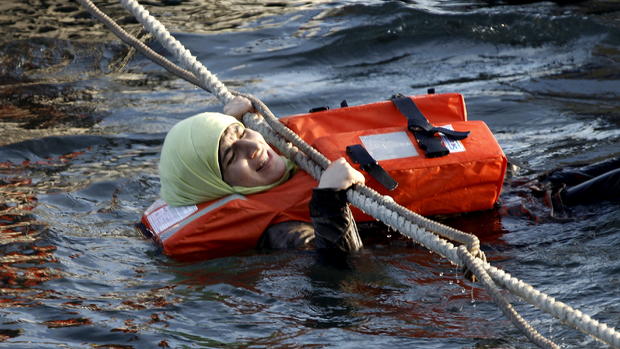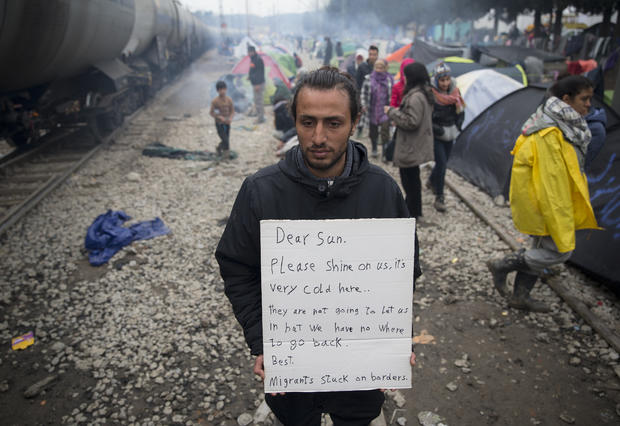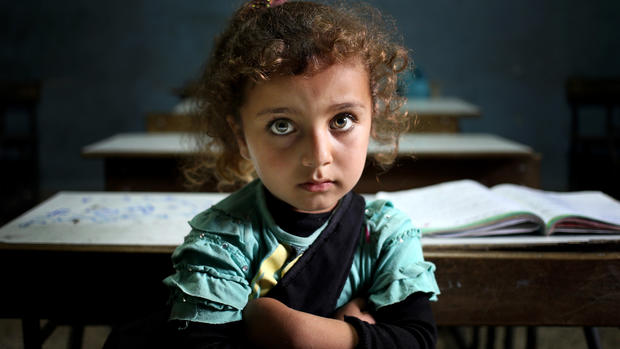After recent lull, an influx of migrants in Europe
BRUSSELS -- Italy's coast guard says about 2,500 people have been rescued in more than a dozen operations in the Straits of Sicily over the past two days. Three bodies also have been recovered.
After a recent lull in crossings to Italy from Libya, the numbers mark a dramatic increase.
In years past, warmer weather and calmer seas in spring and summer have often led to a surge in smuggling activity from north Africa toward Italy.
Italian lawmakers have approved Oct. 3 as a day to remember migrants who have perished in the Mediterranean Sea.
The date is the anniversary of the 2013 shipwreck off Lampedusa that left 366 migrants dead, and shook the Italian government into launching sea patrols to rescue migrants, many of them fleeing war and poverty.
Laura Boldrini, the president of the lower house and a former spokeswoman in Italy for the U.N. refugee agency, said on Twitter that Wednesday's approval of the day of remembrance for migrants "is a sign of civility of our parliament."
Senate president Pietro Grasso appealed to Europe to "overcome egoism and divisions" to come up with a plan to help migrants make the journey safely. He said some 4,200 migrants have died trying to reach Europe since the beginning of 2015.
Macedonian authorities say 362 migrants, mostly from Syria, have been stranded for 10 days in no man's land on the country's border with Serbia.
Goran Stojanovski, head of the national crisis management center at border town of Tabanovce, told the AP on Wednesday that the migrants are refusing to leave the area, where they are camped out in a muddy field, and are hoping that the border will reopen so then can travel to Germany.
German Chancellor Angela Merkel says the current migrant crisis can only be solved if all European leaders heading to the EU summit in Brussels are interested in finding a common solution.
Merkel, in a speech to German Parliament on Wednesday, called the migrant question the biggest challenge for Europe in decades. She reiterated her support for a deal with Turkey, which includes the return of refugees there in exchange for EU financial support and negotiations about a possible Turkish EU membership.
Merkel says the numbers of migrants entering Europe illegally needs to go down permanently and for that Europe needs Turkey's help.
She stressed only a common agreement could in the long run guarantee that Europe will come out of the crisis stronger than it has entered it.
About 1,000 migrants and refugees in total are stranded in Macedonia after Balkan countries closed borders along the 1,200-kilometer 745-mile route between Greece and Austria.
Police spokesman Toni Angelovski told the AP that no illegal crossings have been registered since Monday, when some 1,500 dwellers of a border camp in neighboring Greece staged a dramatic crossing into Macedonia along a rugged section of the frontier.
In late February, Macedonian police fired tear gas and stun grenades as several hundred Iraqi and Syrian refugees, frustrated at days of delays in crossing the Greek-Macedonian border, broke down a gate at a nearby rail crossing.
The migrants had pushed their way past Greek police to reach the gate, chanting "Open the border!" and "We want to go to Serbia!" the next country north on the Balkan migration route leading into Western Europe.
Police repelled the protesters and no arrests or injuries were reported in the clashes.
The man leading European Union talks on the contested deal with Turkey to deport thousands of migrants says a lot of work remains to be done if the agreement is to be finalized at an EU summit on Friday.
EU President Donald Tusk wrote Wednesday in an invitation to the bloc's leaders that "the catalog of issues to be resolved before we can conclude an agreement is long."
Tusk said the priority is to ensure that the deal respects international law, does not create new routes to Europe and provides help to Greece as it sets up the system for returning migrants to Turkey.
EU leaders and Turkish Prime Minister Ahmet Davutoglu are set to seal the deal on Friday. Under it, EU nations would take in one Syrian refugee from Turkey for every irregular migrant returned to the country.
The Czech government says its priority is to use the already approved EU scheme for redistributing migrants to directly relocate Syrians from Turkey.
In a mandate for Prime Minister Bohuslav Sobotka for the EU summit with Turkey approved Wednesday, the government says the Czechs would be ready to accept the refugees as part of the previously approved plan to relocate 120,000 people among the EU member states.
But the government also says it is opposing any deal that would contain new commitments to accept a bigger number of migrants.
As part of a broader deal, Turkey has offered to take back some migrants if an equal number are allowed into the EU legally.
The European Union told member states they "urgently need to deliver" on commitments to settle refugees on the continent, as the number of arrivals in Greece alone reached the million mark since the start of 2015.
EU migration commissioner Dimitris Avramopoulos warned that the "humanitarian situation in Greece (is) getting more acute every day" after newly-built shelters there exceeded capacity.
The warning came on the eve of a summit of leaders from the EU and Turkey to try and limit the number of refugees and migrants coming to Europe.
The European Commission insists that Turkey will be offered no shortcuts toward membership talks or visa liberalization during this week's summit aimed at clinching a deal on how Ankara can ease the EU's migration crisis.
Commission vice president Frans Timmermans insisted Turkey would have to respect all the conditions to make visa liberalization a reality by June, a deadline many have called extremely tight.
Timmermans said that a speeding up of membership talks would also be conditional on the position of all member states, each of which can stop any sizable progress. He said "we are certainly not giving Turkey a free ride."
He also insisted that the outline agreement of March 7 to send back irregular migrants to Turkey and instead accept Syrian refugees in Turkey to be resettled legally in the EU would meet legal standards.


